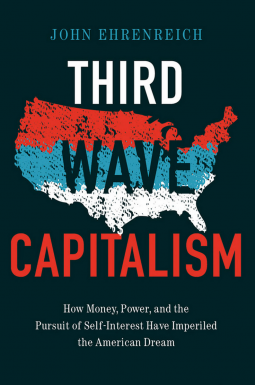
Third Wave Capitalism
How Money, Power, and the Pursuit of Self-Interest Have Imperiled the American Dream
by John Ehrenreich
This title was previously available on NetGalley and is now archived.
Send NetGalley books directly to your Kindle or Kindle app
1
To read on a Kindle or Kindle app, please add kindle@netgalley.com as an approved email address to receive files in your Amazon account. Click here for step-by-step instructions.
2
Also find your Kindle email address within your Amazon account, and enter it here.
Pub Date Apr 05 2016 | Archive Date Apr 26 2016
Cornell University Press | ILR Press
Description
In Third Wave Capitalism, John Ehrenreich documents the emergence of a new stage in the history of American capitalism. Just as the industrial capitalism of the nineteenth century gave way to corporate capitalism in the twentieth, recent decades have witnessed corporate capitalism evolving into a new phase, which Ehrenreich calls "Third Wave Capitalism."Third Wave Capitalism is marked by apparent contradictions: Rapid growth in productivity and lagging wages; fabulous wealth for the 1 percent and the persistence of high levels of poverty; increases in the standard of living and increases in mental illness, personal misery, and political rage; the apotheosis of the individual and the deterioration of democracy; increases in life expectancy and out-of-control medical costs; an African American president and the incarceration of a large percentage of the black population.Ehrenreich asserts that these phenomena are evidence that a virulent, individualist, winner-take-all ideology and a virtual fusion of government and business have subverted the American dream. Greed and economic inequality reinforce the sense that each of us is "on our own." The result is widespread lack of faith in collective responses to our common problems. The collapse of any organized opposition to business demands makes political solutions ever more difficult to imagine. Ehrenreich traces the impact of these changes on American health care, school reform, income distribution, racial inequities, and personal emotional distress. Not simply a lament, Ehrenreich's book seeks clues for breaking out of our current stalemate and proposes a strategy to create a new narrative in which change becomes possible.
Available Editions
| EDITION | Other Format |
| ISBN | 9781501702310 |
| PRICE | $29.95 (USD) |
Featured Reviews
 David W, Media/Journalist
David W, Media/Journalist
Everything that’s wrong in one tight package
The proposal is that there are three stages of capitalism. The first wave was industrial, the second was corporate, and the third is corporate strangulation, which John Ehrenreich calls Third Wave Capitalism. As evidence, the book is an endless litany of failure at the hands of special interests. The focus is two chapters – healthcare and schools - which are Ehrenreich’s fields, being a clinical psychology professor.
Corporations have overrun government. They extract rents from all of us by obtaining the rights to formerly government services. They charge more and perform less because they need to show massive profits, and because they pay themselves exorbitant salaries not found in the civil service. The result is a frustrated, overeducated workforce pathetically underemployed and underpaid, fear of everything from job loss, to debt, to a poisoned environment, the breakdown of families, friendships, empathy, solidarity and even of faith that America is the land of opportunity. Business has finally conquered the last bastions of government services, and is in the process of dismantling them for their own profit. These include education (“the last government monopoly”), healthcare, prisons and defense. Corporates now write the laws that congressmen present, and hide their profits overseas, declining to invest in the US. Inequality is unprecedented, and the fear mongers instill the need for even less government than what little remains in its purview.
The problem with Third Wave Capitalism is that it does not actually describe an aspect of capitalism. This third wave is not foreordained, required or inevitable in economics. It is not a predictable outcome or separate phase. It is not falsifiable, proven or replicated. There are no other countries in the world that have ever passed through this stage. Canada’s Central Bank is not a club for private bankers. France’s medical system is far less expensive yet more effective. Japanese schools produce graduates without compromising the economy. The USA is doing this to itself by itself.
There is no shortage of gloom in the USA. There is a firm and widely held (72%) belief that not just the economy but all of American society has derailed. People hardly vote, because no matter how many support something, it will not be done (unless it benefits business). The examples of healthcare and education are stomach churning confirmations, but it doesn’t mean that this isn’t just standard graft and greed gone wild. Calling it The Third Wave of Capitalism is not fair or accurate, either. Rather, this is the logical progression of the Corporate Capitalism era, where (now) giant corporates take advantage of their ever-increasing size, political connections and donations to extract rents from the last bastions of public good. After that is accomplished and the ensuing disaster it portends plays out, we will then see what the new phase of capitalism might be. It might not be capitalism.
Ehrenreich blames the Left for not being as astute and manipulative as the Right. Americans therefore lost all that society achieved under numerous presidents righting clear wrongs. There is essentially nothing standing in the way of complete corporate dominance in the USA.
The final (unintended) impression is what a miserable place to live.
David Wineberg
Readers who liked this book also liked:
Dominic Pettman
Health, Mind & Body, Nonfiction (Adult), Politics & Current Affairs











